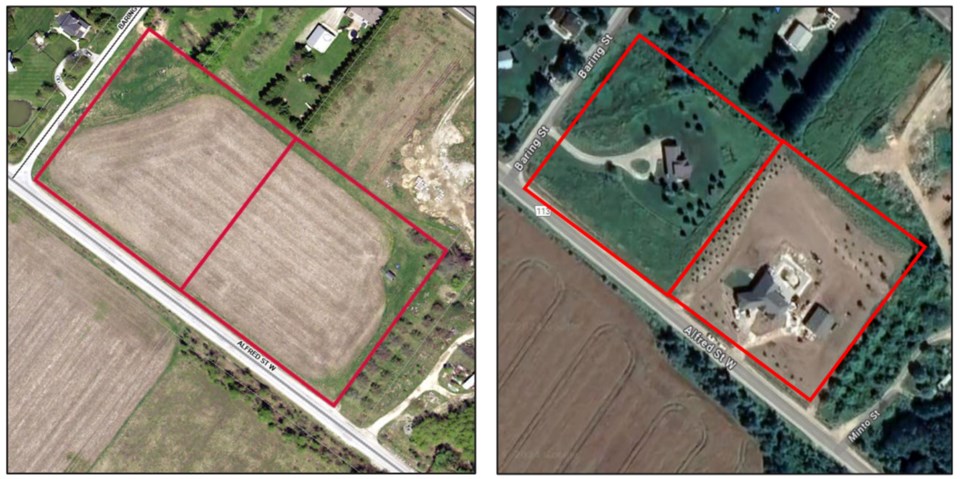The rights of private property owners have prevailed over future planning concerns in the Town of The Blue Mountains.
At its committee of the whole meeting on June 11, The Blue Mountains council pushed off a decision on a town-initiated zoning bylaw amendment that, if implemented, would require a zoning bylaw amendment for a property owner to build a single dwelling on any lands zoned for development in town settlement areas.
Members of council expressed a multitude of concerns about the impact the zoning change would have on private property owners and deferred making a decision on the matter. Council instead requested town staff bring more options for consideration in a future report.
Town staff brought forward the initiative to address what they called a troubling development pattern in the town’s settlement areas. Current town planning policies, which staff say are out of date, allow single homes to be built on lands zoned for future development regardless of the size of the lot.
As a result, several single-family homes have recently been constructed on lots that are zoned for future development, essentially eliminating settlement area lands from being used for future growth that could include infill development or higher-density proposals.
In an amendment to the town’s zoning regulations staff proposed a number of measures to implement some control over the issue.
The most controversial aspect of the proposed amendment would require a full rezoning process to allow a single-family home on any land zoned for development. Rezonings must be approved by council after a public process and can be appealed to the Ontario Land Tribunal.
The town held a public meeting about the zoning amendment recently and there was some public opposition expressed at the meeting.
“The goal is to make sure, as the town develops, we’re developing in a way that creates complete communities,” said town planner Carter Triana, who stressed that the controls being proposed were not a moratorium on single homes being built on vacant development lots. Rather, council’s permission, through a zoning bylaw amendment, would be required for such a proposal to proceed.
“Staff see this as a pivotal decision for council,” said Triana, whose report on the matter included several examples of where low-density development has already occurred on development lots in the town’s settlement areas.
The recommendations in the report didn’t sit well with members of council who expressed reservations about limiting the options of private property owners.
“I have a huge fundamental problem with this,” said Deputy Mayor Peter Bordignon. “What about private landowners? This is not [town-owned] land. If you own a piece of land, you should be able to build a home. Does this not infringe, too much from a planning point of view, on a private landowner’s rights?”
Triana said in his professional opinion the proposed amendment was not an infringement on private property rights, but was simply adding an “extra step” to the process.
Other members of council expressed similar concerns as Bordignon.
“I think of the people whose land designation has changed and they didn’t know,” said Coun. June Porter. “It’s a real dilemma for me. I also see the need.”
Coun. Gail Ardiel called the proposal “extra taxation” on property owners with vacant lots. Aridel noted that the town already has plenty of fees in place for anybody who wants to build anything.
“They add up after a while,” said Aridel. “It gets to the point that it's unaffordable.”
Mayor Andrea Matrosovs suggested staff provide council with other options to consider.
“There’s not a lot of appetite for telling people what they can or cannot do on their land,” said Matrosovs. “Is there another way we can approach this to make it simpler?”
Matrosovs said she understood the need to protect lands for future development, infilling and intensification. She noted that the province has determined that growth should be in settlement areas and that the town doesn’t want to run into a situation where it runs out of settlement area land and sees growth “sprawl into agricultural areas.”
The mayor said she preferred to see an option that would incentivize owners of development land.
“Is there a way we could reverse this philosophy?” Matrosovs asked.
Coun. Paula Hope agreed.
“Telling people what to do with their land, I’m not sure I want to go down that route,” said Hope. “I prefer carrots, not sticks. I’d prefer we not be punitive in any way.”
Coun. Alex Maxwell pointed out there were also benefits to having a single home on a lot. He said in such a situation the homeowner has a large yard that effectively becomes “green space maintained by a private individual.”
“We need to look at the collective rights of individuals,” said Maxwell.
Coun. Shawn McKinlay suggested the town look into the community planning permit system in place in other Ontario municipalities.
In light of the concerns raised by council, Triana suggested a decision on the amendment be deferred for the time being to allow staff to have more conversations about the situation and to bring back a follow-up report with more options for council to consider.
“I wouldn’t want to see this go back to the drawing board,” said Triana.



